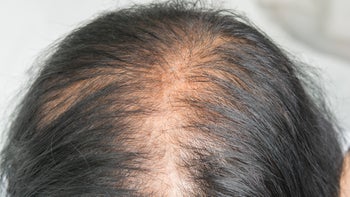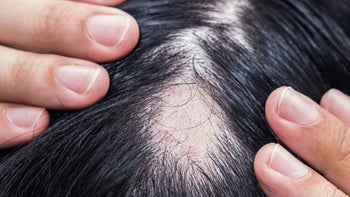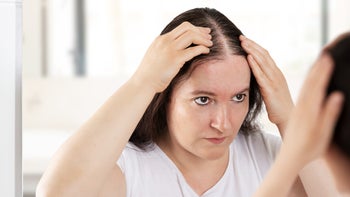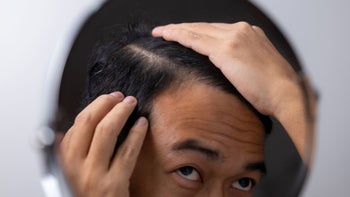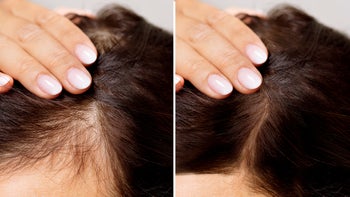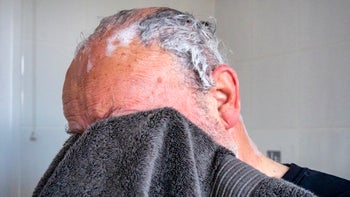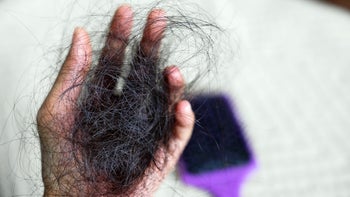
How to Find the Best Shampoo to Treat Hair Loss in Men
Key takeaways:
Shampoos containing topical minoxidil can help with hair regrowth from male pattern baldness.
Medicated shampoos can help if hair loss is from a scalp condition like ringworm or psoriasis.
Some shampoo ingredients can worsen hair loss. Avoid shampoos that contain formaldehyde and — if you have sensitive skin — sulfates.
Table of contents

If you’re struggling with thinning hair or hair loss, you’re not alone. Research shows half of men experience hair loss by the time they’re 50 years old. And it’s no surprise that many people want to take action to restore their hair.
There are many shampoos that promise hair growth. But do any of them work? Let’s take a look at shampoos for hair loss and the results you can realistically expect.
What’s the best shampoo for men’s hair loss?
There’s no “best” shampoo for hair loss. That’s because the “best” shampoo depends on why you’re experiencing hair loss or thinning.
Search and compare options
Below, we go over four shampoo ingredients and types that can help with hair loss.
1. Minoxidil
Minoxidil (Rogaine) is a medicated shampoo. It’s FDA approved to treat androgenic alopecia, also known as male-pattern hair loss or male-pattern baldness. Minoxidil 5% shampoo is available over the counter (OTC).
Minoxidil works by increasing blood flow to the scalp, which can help hair follicles regrow. If you have male-pattern hair loss, research shows that applying 5% minoxidil daily can:
Promote hair regrowth
Minoxidil hasn’t been approved to treat other forms of hair loss in men.
Most people start to see results within 2 to 4 months if they use the shampoo consistently. Minoxidil doesn’t cure male-pattern hair loss. So you have to continue using minoxidil shampoo to see results. If you stop using the shampoo, your hair will stop growing and hair thinning will come back.
2. Medicated dandruff shampoo
Medicated dandruff shampoos are another option. They can help with hair loss from scalp inflammation caused by seborrheic dermatitis and dandruff.
Can supplements help treat hair loss? What the evidence shows about supplements for hair loss in men.
How long do hair-loss medications take to work? It can take several months to see results, but it depends on the specific treatment.
Who’s at risk for hair loss? Learn about the causes of male-pattern baldness.
Dandruff and seborrheic dermatitis can cause scalp itching, flaking, and redness. Over time, inflammation on the scalp can also lead to hair thinning and hair loss. Medicated dandruff shampoos can help calm this inflammation. This improves your overall scalp health. And it can help hair follicles regrow.
Look for medicated dandruff shampoos that contain these ingredients:
These shampoos are available OTC. You should start seeing improvement in flaking, itchiness, and redness within 2 to 4 weeks of consistent use. But it’ll take longer to see changes in your hair’s fullness and thickness.
Talk to your primary care provider or a dermatologist if OTC medicated shampoos don’t seem to help your scalp symptoms. You may need prescription-strength shampoos or other topical treatments to treat seborrheic dermatitis.
3. Coal tar shampoo
Coal tar shampoo is an OTC medicated shampoo that can help with hair loss from psoriasis. Coal tar shampoo can help lower inflammation on the scalp. This, in turn, can promote hair growth. It may also help ease itchiness, redness, and flaking.
There are some side effects to using coal tar shampoo:
It can cause skin irritation and make your hair more dry and brittle.
It also makes your skin more sensitive to sunlight. This can increase your risk of developing scalp sunburn.
And it has an unpleasant smell.
These side effects — along with newer psoriasis treatments — have made coal tar shampoo less popular. But some experts still recommend using it in addition to other treatments for scalp psoriasis.
Coal tar shampoo 0.5% and 1% can be used daily. Higher strengths can be used less often.
Let the shampoo sit on your scalp for 5 to 10 minutes and then rinse it off.
4. Natural remedies
Some hair-growth shampoos are based on natural hair-growth remedies. They may contain a variety of botanicals and herbs that are said to promote hair growth. Popular ingredients include things like caffeine, melatonin, and essential oils.
However, there’s not a lot of good research showing that these products actually work to stop hair loss or promote hair growth. Here’s what we know so far:
Some studies show that caffeine solutions may stimulate hair growth when applied to the scalp.
There’s also research showing that melatonin may prevent hair loss when applied directly to the scalp.
And one small study found that rosemary oil worked as well as minoxidil for hair regrowth.
But these studies weren’t done with shampoos. Shampoos that you’ll find in the store contain lower concentrations of the ingredients used in these studies. So it’s not clear how well shampoos with lower concentrations of these ingredients work for hair growth.
What should you avoid when looking for products to treat hair loss?
It’s important to avoid products that can irritate your scalp and cause inflammation. This can damage your hair follicles — and worsen your hair loss and thinning.
Some ingredients in shampoos and hair products have been linked to hair loss. If you’re trying to slow down hair loss, avoid shampoos with ingredients that may irritate the scalp. Here are some ingredients to avoid:
Formaldehyde
DMDM hydantoin
Fragrances
No shampoo can prevent hair loss. But avoiding these ingredients can help keep your hair follicles healthy over time.
How long does it take for hair-loss shampoo to work?
It usually takes at least 3 to 6 months to see noticeable results from hair-loss treatments. That’s because it takes time for your scalp and hair follicles to respond to the medication. And then it takes more time for enough hair to grow in for you to see results.
It’s important to use your product consistently. Follow the manufacturer’s instructions or your prescriber’s directions for use. Using the shampoo as directed gives you the best chance of getting results.
The bottom line
There’s no magic shampoo for hair loss. The right product depends on what’s causing your hair loss. Minoxidil can help with male-pattern hair loss. Medicated dandruff shampoos and coal tar shampoo can be the right choice for scalp conditions that lead to hair loss. No shampoo can prevent hair loss. But avoiding ingredients like formaldehyde and sulfates can help keep your scalp and hair follicles healthy.
Why trust our experts?



References
American Academy of Dermatology Association. (n.d.). Psoriasis treatment: Coal tar.
Birchall, N. M. (2015). Male pattern hair loss. DermNet.
Fields, J. R., et al. (2020). Topical ketoconazole for the treatment of androgenetic alopecia: A systematic review. Dermatologic Therapy.
International Society for Hair Restoration Surgery. (n.d.). Minoxidil: Formulation, dosage & side-effects.
Monselise, A., et al. (2015). What ages hair? International Journal of Women’s Dermatology.
National Health Service. (2022). Side effects of coal tar.
National Health Service. (2024). Common questions about ketoconazole.
Panahi, Y., et al. (2015). Rosemary oil vs minoxidil 2% for the treatment of androgenetic alopecia: A randomized comparative trial. Skinmed.
Rusanova, I., et al. (2019). Protective effects of melatonin on the skin: Future perspectives. International Journal of Molecular Sciences.
Suchonwanit, P., et al. (2019). Minoxidil and its use in hair disorders: A review. Drug Design, Development and Therapy.
U.S. Food and Drug Administration. (2022). Allergens in cosmetics.
Völker, J. M., et al. (2020). Caffeine and its pharmacological benefits in the management of androgenetic alopecia: A review. Skin Pharmacology and Physiology.



